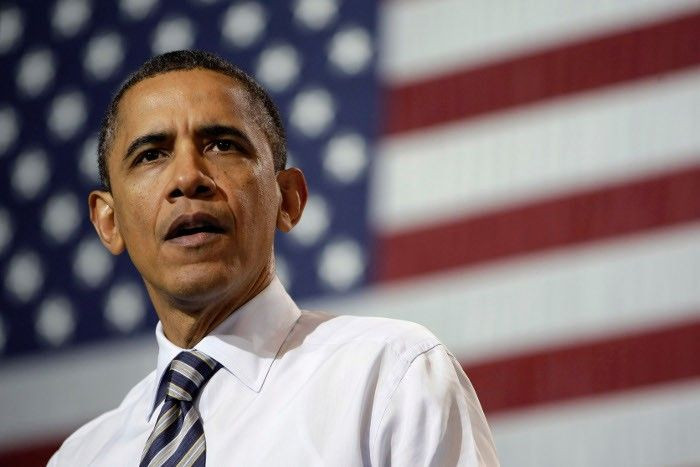Obama Hits Romney on Auto Bailout, Again, on Michigan Primary Day

President Barack Obama on Tuesday hit Republican presidential challengers hard during a speech at the United Auto Workers conference in Washington, most notably lashing out at former Massachusetts Gov. Mitt Romney for his opposition to the auto bailout.
Obama took shots at Romney for his opposition to the bailouts in 2008, on which both Obama and President George W. Bush signed off in 2008 and 2009. And he took a rather incredulous approach to Romney's recent backtracks, saying the U.S. government took his advice of a managed bankruptcy all along.
It's been funny to watch some of these politicians completely rewrite history now that you're back on your feet, Obama said during an approximately 25-minute speech, according to Politico. These are the folks who said if we went forward with our plan to rescue Detroit, 'You can kiss the American automotive industry goodbye.'
That's a direct quote from Romney's 2008 op-ed in The New York Times, but Obama did not directly call out Romney in his speech.
Obama's speech came on the same day that Michigan residents are voting in the state's Republican primary, as front-runners Romney and former Pennsylvania Sen. Rick Santorum are locked in a dead heat for the state. Michigan serves as the center of the U.S. auto industry, home to the Big Three U.S. automakers of General Motors Co., Chrysler Group LLC and Ford Motor Co.
Now they're saying, 'We were right all along,' Obama said of the GM and Chrysler bailouts, chuckling and inspiring more cheers and laughter from the audience.
Then he moved on to Romney's recent comments that the administration used the bailout to essentially pay off the UAW workers that had voted for his election in 2008.
Really? Obama said, looking amazed. Even by the standards of this town, that's a load of you-know-what.
Obama and Romney have already traded high-profile jabs on the $80 billion auto industry bailout in preparation for a possible general election fight. Romney has said he supported a managed bankruptcy process that would have put the automakers through a traditional bankruptcy process funded by private capital. The problem with this, say analysts, political strategists and Steven Rattner, the head of Obama's auto task force, is that there was no private capital available to fund the bankruptcies.
GM recently reported a record profit of $7.6 billion, and last year retook the throne of the world's top-selling automaker. Chrysler announced its first annual net profit since 1997 in February.
It's unclear what part, if any, the bailout will play on the Michigan primary. A Pew Research Center survey released last week conducted in early February showed that 56 percent of people said the GM and Chrysler loans were mostly good for the economy. Only 38 percent said they were mostly bad for the economy. That's nearly a complete flip from October 2009.
Michigan's primary is open, meaning Democrats can vote. Santorum has also opposed the auto bailout, but Romney has been especially vocal on the issue. He even wrote another op-ed in The Detroit News recently, reiterating defense for his position and calling Obama's bailout crony capitalism.
The greater hit is on Romney because he's been so vocal for so long, said Peter Fenn, a Democratic political strategist whose Fenn Communications Group has worked with GM in the past. My sense is that doubling down on his initial mistake is not the wisest political move.
That said, it could become even more of an issue in the general election, when Obama will look to champion the success of the auto companies against, potentially, Romney's strong dissent. He continued in his speech Tuesday by asking UAW members to ponder what Republicans' choices would have meant for the country.
Production: shut down. Factories: shuttered, he said. Once-proud companies chopped up and sold off for scraps. And all of you -- the men and women who built these companies with your own hands -- would've been hung out to dry.
© Copyright IBTimes 2025. All rights reserved.





















